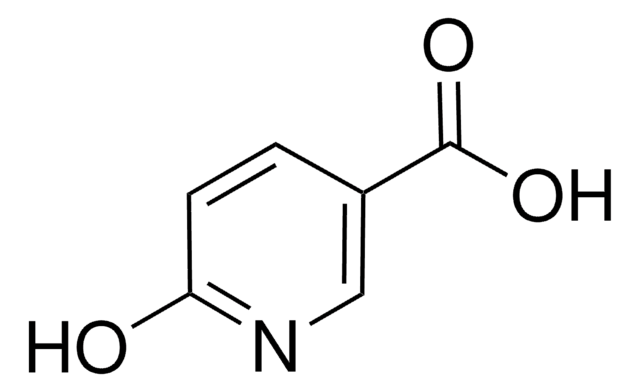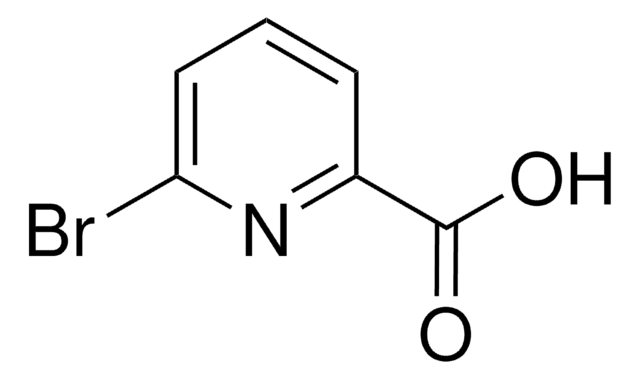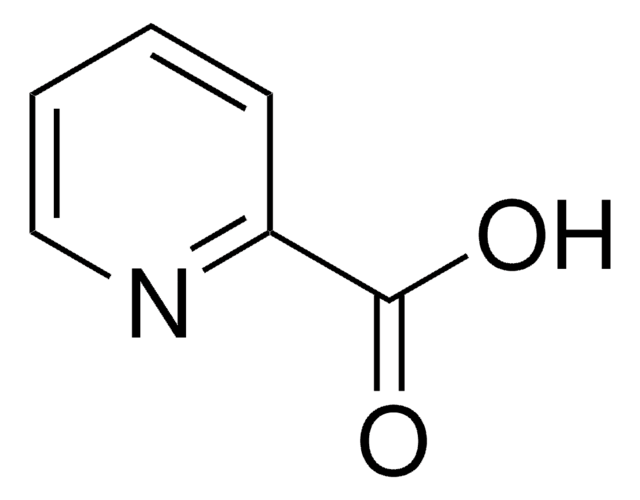추천 제품
분석
95%
형태
solid
mp
270 °C (dec.) (lit.)
SMILES string
OC(=O)c1cccc(O)n1
InChI
1S/C6H5NO3/c8-5-3-1-2-4(7-5)6(9)10/h1-3H,(H,7,8)(H,9,10)
InChI key
VRCWSYYXUCKEED-UHFFFAOYSA-N
유사한 제품을 찾으십니까? 방문 제품 비교 안내
일반 설명
6-Hydroxypyridine-2-carboxylic acid (6HPA, 6-Hydroxypicolinic acid) is a picolinic acid derivative. It has been reported to exhibit enol-keto tautomerism. It is a chelating ligand exhibiting potential complexing ability (via N,O-chelation or N,O,O-chelation). Intramolecular proton transfer (IPT) in tautomeric forms of 6HPA has been investigated by density functional theory (DFT) calculations.
애플리케이션
6-Hydroxypyridine-2-carboxylic acid may be used in the preparation of ruthenium(II) complex, [RuH(CO)(6-OH-py-2-COO)(PPh3)2].
신호어
Warning
유해 및 위험 성명서
Hazard Classifications
Eye Irrit. 2 - Skin Irrit. 2 - STOT SE 3
표적 기관
Respiratory system
Storage Class Code
11 - Combustible Solids
WGK
WGK 3
Flash Point (°F)
Not applicable
Flash Point (°C)
Not applicable
개인 보호 장비
dust mask type N95 (US), Eyeshields, Gloves
시험 성적서(COA)
제품의 로트/배치 번호를 입력하여 시험 성적서(COA)을 검색하십시오. 로트 및 배치 번호는 제품 라벨에 있는 ‘로트’ 또는 ‘배치’라는 용어 뒤에서 찾을 수 있습니다.
Computational study of the intramolecular proton transfer between 6-hydroxypicolinic acid tautomeric forms and intermolecular hydrogen bonding in their dimers.
Kazemi Riabi SH, et al.
Physical Chemistry Research, 1, 117-125 (2013)
Synthesis, molecular, spectroscopic and catalytic characterization of ruthenium (II) complexes with pyridine-2-carboxylic acid derivatives ligands.
Malecki JG, et al.
Polyhedron, 48(1), 21-30 (2012)
Jennifer A Jacobsen et al.
Journal of medicinal chemistry, 54(2), 591-602 (2010-12-30)
Fragment-based lead design (FBLD) has been used to identify new metal-binding groups for metalloenzyme inhibitors. When screened at 1 mM, a chelator fragment library (CFL-1.1) of 96 compounds produced hit rates ranging from 29% to 43% for five matrix metalloproteases
자사의 과학자팀은 생명 과학, 재료 과학, 화학 합성, 크로마토그래피, 분석 및 기타 많은 영역을 포함한 모든 과학 분야에 경험이 있습니다..
고객지원팀으로 연락바랍니다.









